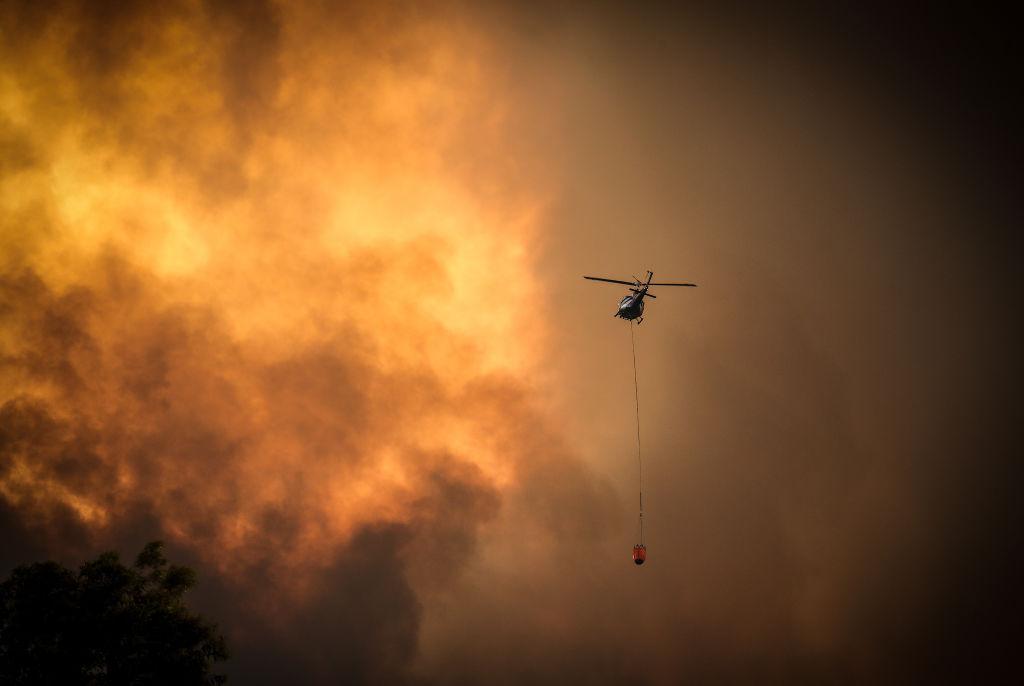
Welcome to the first edition of ‘The threat spectrum’, a twice-monthly update focusing on non-traditional security threats. It’s divided into five sections covering climate change (Planet A), trends in democracy and authoritarianism (Democracy watch), mis- and disinformation (Information operations), economics and global finance (Follow the money), and counterterrorism and non-state actors (Terror byte).
Planet A
With Australia’s bushfire season having already begun, the bushfire royal commission released an interim report that attempts to quantify the impact of the devastating 2019–20 season and to outline strategies for mitigating future natural disasters.
The commission’s final report, due on 28 October, is expected to recommend sweeping changes to how the federal government responds to natural disasters. Much like the interim report, the final report will probably favour strategies that improve disaster management coordination and climate adaptation rather than those that reduce carbon emissions.
While mitigation and disaster management are important, reducing emissions is critical in mitigating future bushfires, according to ASPI’s Robert Glasser. Taking a long-term view of this issue is essential. While the 2020–21 bushfire season may not be projected to be as severe as last year’s, climate change will only exacerbate the intensity and frequency of bushfires across Australia.
Democracy watch
In Thailand, a number of activists, political leaders and even rappers have been arrested on charges of sedition for leading pro-democracy protests against the military government run by Prime Minister Prayut Chan-o-cha.
These arrests, described by protestors as a ‘strategic lawsuit against public participation’, have been characterised as using legal action to intimidate opponents of the government to the point where they abandon criticism and dissent. According to Human Rights Watch, ‘each new arrest of a peaceful pro-democracy activist shows the Thai government’s authoritarian tendencies and lack of respect for human rights’. Prayut has denied allegations of attempted political crackdowns. The arrests have not prevented protests across Thailand from happening on a near-daily basis since July.
The democracy movement, driven by young Thais, is aimed at pressuring the Prayut government to respect the democratic rights and freedoms of Thai citizens via three core demands: dissolving parliament, stopping harassment of citizens and rewriting the constitution. But protesters have also issued 10 additional demands for reforming the monarchy, traditionally a sensitive subject in Thailand.
Information operations
The US Defense Department has released its 2020 report on military and security developments in China. The report noted that the People’s Liberation Army is pursuing an ‘intelligentised warfare’ approach through its military–civil fusion strategy. Most of these operations will be led by the PLA’s Strategic Support Force, which was formed in 2016 to coordinate missions involving cyberwarfare, reconnaissance, electronic warfare and psychological warfare.
Recent developments in artificial intelligence, cloud computing, big data and quantum information networks will increase the speed of future combat, demanding accelerated processing of real-time information to support rapid decision-making.
The PLA’s ‘informationised’ approach set out to establish information superiority, including by denying an adversary’s abilities to acquire and use information. Intelligentisation shifts the strategy beyond information-gathering to integrating emerging technologies more directly into command-and-control and decision-making structures. The utility of these capabilities will depend on China obtaining large quantities of high-quality data about foreign militaries, as well as recruiting, training and retaining the necessary scientific and technical expertise.
Follow the money
The US enacted sanctions last week against individuals and companies ‘responsible for or complicit in’ China’s actions in the South China Sea. The impact of these measures may be limited given that many of the targeted companies don’t do a lot of trade with the US. However, it’s hoped that other countries and entities that might consider doing business will be deterred from engaging with them.
The move could affect China’s Belt and Road Initiative, as two of the sanctioned companies, China Communications Construction Company and China Electronics Technology Group, are important players in physical and digital infrastructure construction along the belt and road.
But the ability of unilateral US sanctions to drive change in China’s policy settings is arguable. Lessons from US sanctions on Russia indicate that political systems and economies can adapt to the constraints imposed on them. Sanctions in this case, however, may be useful in signalling US resolve on the South China Sea, both domestically and internationally, and may exert some kind of deterrent effect on China’s activities there, as well as on other countries that may seek to flout the international law of the sea.
Terror byte
After the fall of the Islamic State caliphate and the beginning of the Covid-19 pandemic, the world has experienced a period of relative calm in terms of internationally coordinated terrorist attacks. However, Deakin University Professor Greg Barton argues that calm periods like this have often been followed by stronger and more devastating waves of terror, and authorities should therefore be ready to face different challenges in the near future.
The landscape of terrorism has shifted towards a more complex picture, where lone actors and the far-right have gained prominence, and where increasingly dangerous ideologies propagate online at unprecedented speed.
To prepare to counter the next wave of both old and new forms of terrorism, governments need to address the problems of radicalisation arising from social networks, poor community relations, corruption and dependence on military interventionism, as well as the need to improve the agility and innovation of counterterrorism responses.